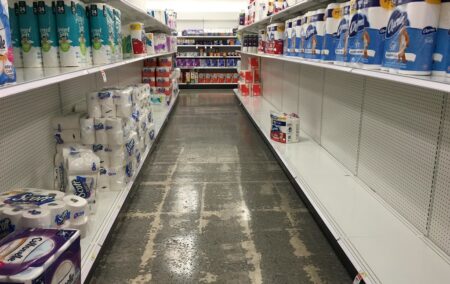With lives in the balance, what is gained by depriving people of their livelihood through excessive regulation? And have restrictions on freedom of movement gone beyond what is necessary to stop the spread of Covid-19?
“There shall be no walking of dogs that will be allowed,” said Police Minister, Bheki Cele, at the security ministerial briefing last week . This was despite Health Minister Zweli Mkhize saying the opposite earlier on the same day. Cele laid down the law with no pretence of diplomacy: “If you break these laws, or regulations, you are six months in [jail] or fines or both. The police [with] support of SANDF, we are ready to make sure these things we talk about of complete non-movement will be implemented and will be implemented accordingly. For 21 days, please stay sober.”
Overstepping their mandate?
Because Covid-19 has caused so much fear, many South Africans would like to do all they can to protect themselves and their loved ones. Why make a fuss about not having something like alcohol for just 3 weeks? But it’s about more than that—it’s about the why.
Some of the reasons provided by the government about the alcohol ban sound compassionate— to prevent domestic abuse in a situation where women and children, who without school or work have no escape from alcohol-exacerbated rage. But other justifications, from – for example – the Southern African Alcohol Policy Alliance in South Africa (SAAPA SA) include that alcohol “reduces a person’s ability to exercise the social distancing and personal hygiene required”. In other words, people may be tempted to break the ‘stay home and don’t mingle’ regulations. This is problematic— the regulation is: you may not leave your house and go to visit friends, but is it the government’s place to remove temptation and with it, the freedom of choice to drink behind closed doors? If someone were to leave their house to go and drink with friends, this could conceivably facilitate spreading the virus. Individuals buying and consuming alcohol cannot in and of itself spread Covid-19. It’s like saying, “Because it is illegal to steal Twinkies, we’re taking them off the shelves, so you won’t be tempted to steal”.
Criminalising behaviour that does not in and of itself facilitate the spreading of Covid-19 begins to look more like an exercise in social control, and less like acting in the interests of the people. It takes away agency for a legal adult to exercise judgement. It penalizes behaviour before it leads to the over-stepping of an established regulation. This is serious, because who’s to say that this new way of government officials infantilizing and criminalising ordinary citizens will go away after the pandemic?
Whilst in no way pooh-poohing the dangers of Covid-19, I am suggesting that we ask some critical questions about what these regulations mean to our economy, industries and ultimately to the future of South African people.
Reasonable Regulations?
Before later retracting the statement, Mkhize had told eNCA News that dog walking would be allowed, as long as walkers/joggers practised social distancing. Following this, the leader of the Economic Freedom Fighters (EFF), Julius Malema tweeted the following:
And later, on the same day, at the Ministerial Security Briefing, Cele and Mkhize asserted that dog walking would indeed not be allowed. But is this reasonable? If a certain level of isolation and avoidance was practised in dog walking, could this actually spread the virus that is supposed to be spread via saliva and close contact? And is it a coincidence that the decision followed Malema’s defiance? Then there’s the alcohol; what is going to happen to our wine industry that in 2015 contributed R36.1 billion to GDP? And most disturbingly, what happens to the people who work for wages? A gardener, for instance, may only have the R160 day’s wage to feed his children for a week. How do they survive for three weeks without that income? Or the waitress who survives on tips and commission? And economically speaking, can we actually come back from this?
To be clear, Covid-19 does not appear to be inconsequential at all. As of 1 April 2020, South Africa has 1 353 confirmed cases, 31 recoveries, 3 deaths, and 7 people in a serious condition. With so many people infected with HIV and TB, the potential havoc it could wreak is terrible. But there are two things to note here. First of all, in a recent Centre for Risk Analysis (CRA) report it was pointed out that although the current Covid-19 mortality rate is estimated at between 1% and 2% globally, it is not completely impossible that these estimates may be skewed by tests being limited to those who are ill. In other words, apparently healthy individuals (or even only mildly sick people) may be carriers of Covid-19 without knowing it. There are still a lot of unknowns here, the worst one being that we don’t know how long the pandemic is going to last. Scenarios explored in the CRA report range from two or three months to two years, depending on the dynamic reactions between the numerous variables at play.
But secondly, in an informal settlement where makeshift houses are right on top of each other and the houses are often not sealed against the elements, or even their neighbour’s cooking fire, will confining people to these tiny spaces actually protect them from contamination? I fear the suffering and impoverishment we will all have to live through, if the economy is destroyed by overly harsh regulations. So many South Africans already live below the breadline, or barely surviving. What’s the point of avoiding Covid-19 only to starve to death in conditions of virtual captivity?

